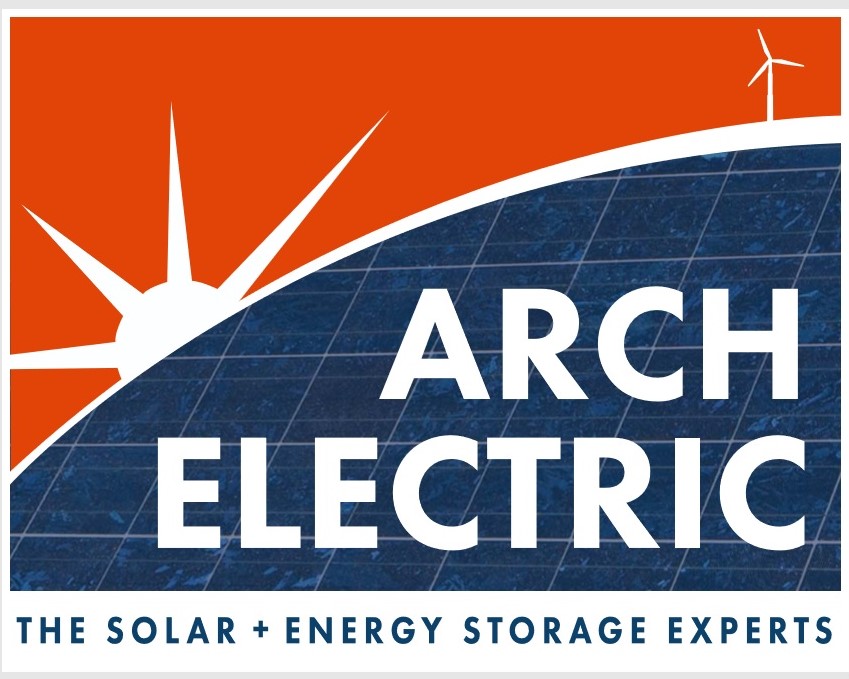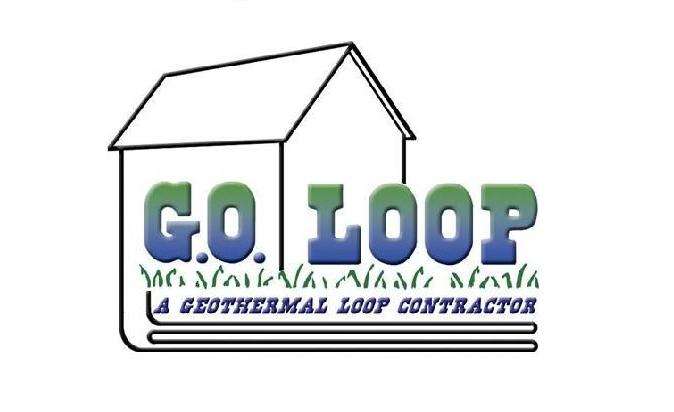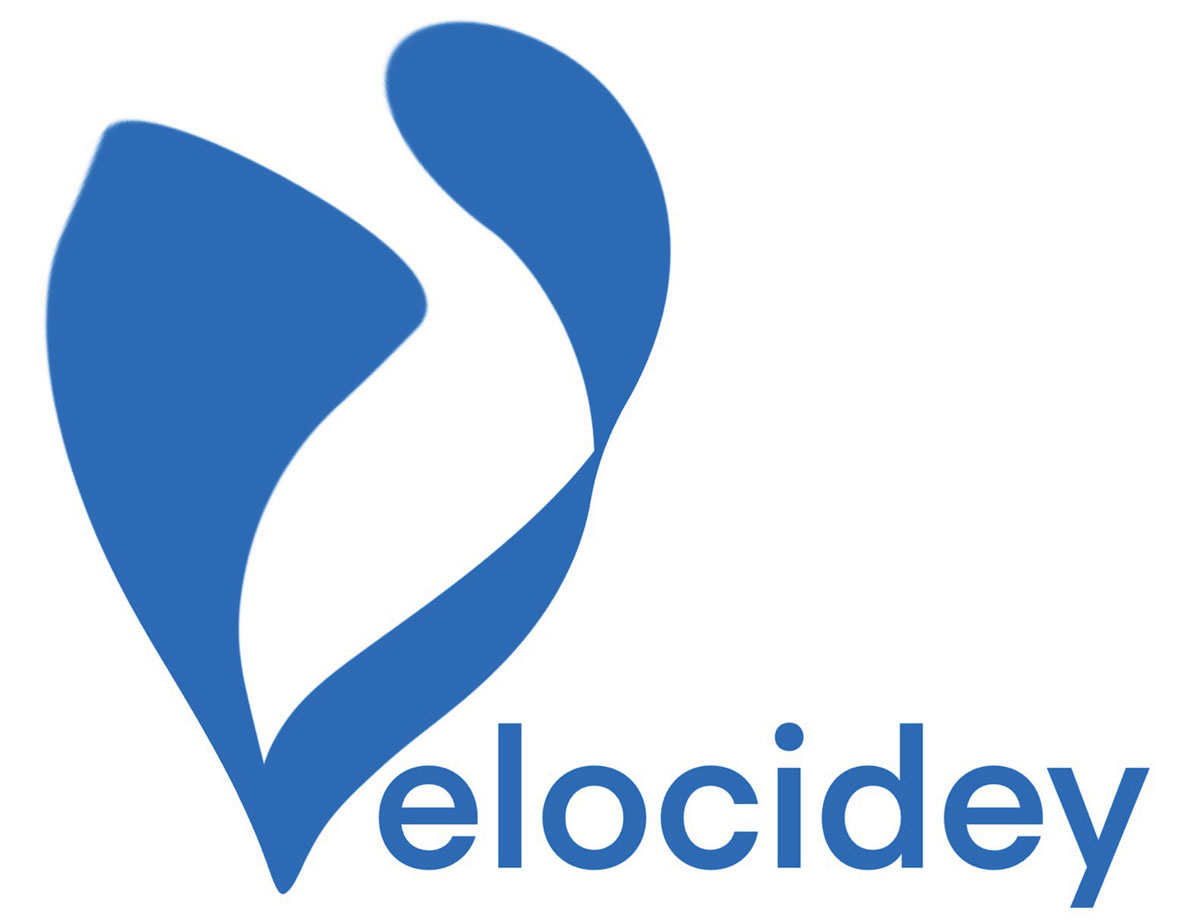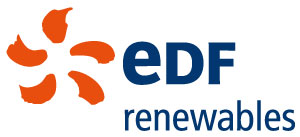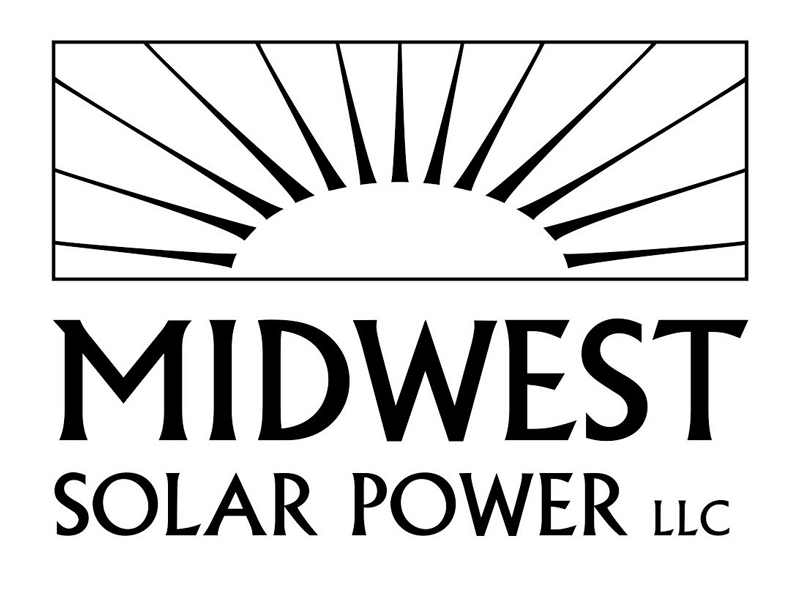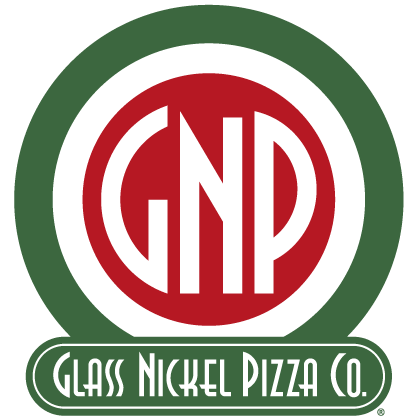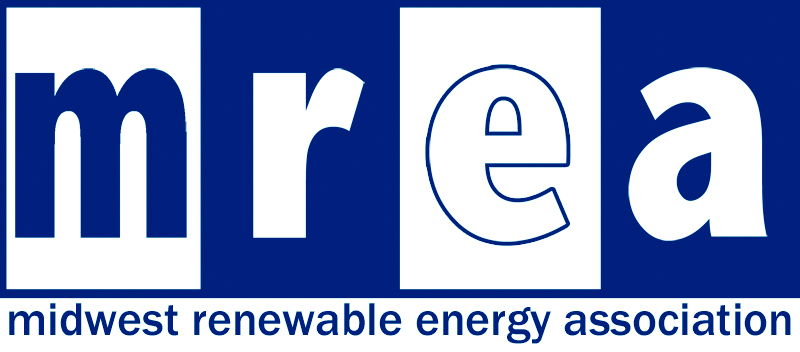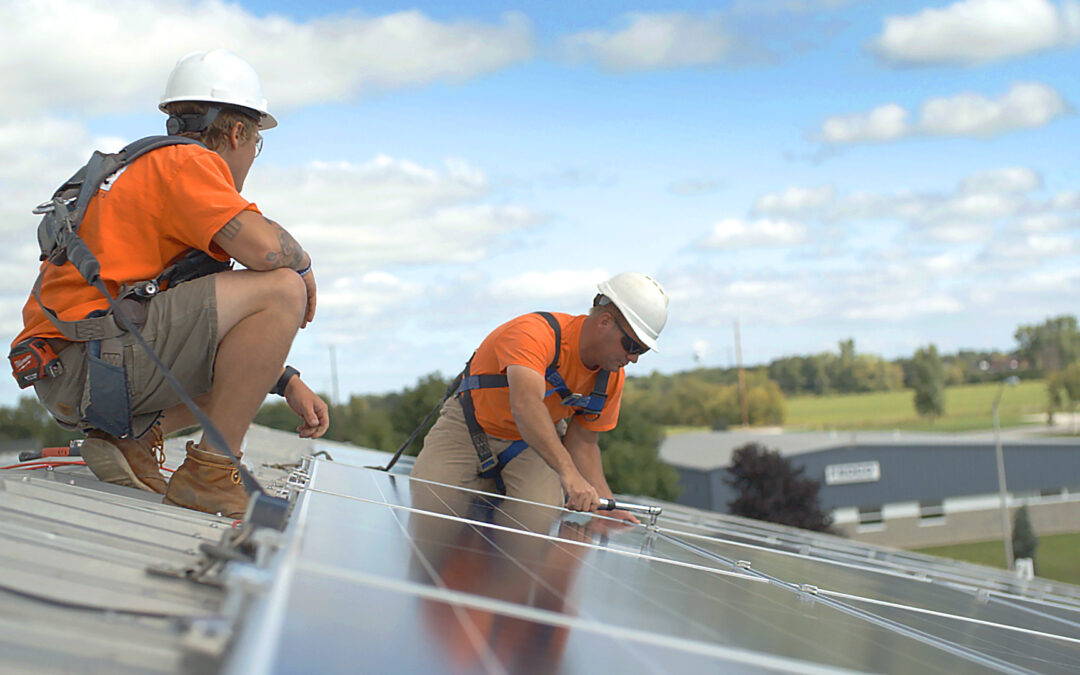
by Heather Allen | Oct 19, 2021 | Advocacy, Electric Vehicles, Jobs, Renewables, Solar
Thirty-one Wisconsin businesses signed a letter supporting ambitious clean energy investments and broad interest in the American Jobs Plan. The signatories, representing higher education institutions, local governments, and biogas, solar, finance, and electric vehicle industries, are committed to “advancing the clean energy economy, building family-sustaining jobs, and expanding economic opportunities for Wisconsinites.”
The letter states, “Wisconsin’s cumulative solar capacity more than doubled in the past year and is anticipated to quintuple in the next 3-5 years. Wisconsin’s clean energy workforce is 76,000 strong, and solar and advanced transportation jobs proved remarkably resilient even during the economic upheaval of 2020.” Investing in these sectors can create jobs and opportunities for Wisconsin to become a clean energy leader in the Midwest.
The electric vehicle sector is a key focus of the American Jobs Plan and an area where Wisconsin has tremendous opportunity to invest. Recent studies and RENEW’s analysis suggest that the federal stimulus funds spent on transportation electrification will yield a 500% return on investment.
Corry Bullis of U.S. FLO said that “Given President Biden’s goal to deploy 500,000 charging stations by 2030, FLO is expanding its manufacturing footprint to meet increasing demand in the U.S and support its climate and air quality goals. Incentives, as outlined by the American Jobs Plan, will be critical to delivering on this promise. We urge Congress to pass an infrastructure package as soon as possible.”
Wisconsin’s solar job market held steady throughout the pandemic. The industry continues to advance, and local job opportunities are growing rapidly, signaling clean energy investments are a bipartisan solution to growing Wisconsin’s economy and advancing careers for local workers.
Ed Zinthefer, an owner of Arch Electric based in Plymouth, WI, says, “More homeowners and businesses are saving money and supporting local jobs in their neighborhoods by going solar. We are busier than ever, growing and hiring and building more clean energy projects. It’s a great time to get into clean energy in Wisconsin.”
Even as the renewable energy markets are growing, there is an urgent need to drive investment and expand our workforce. According to the Solar Energy Industry Association, the solar industry is on a trajectory to reach 400,000 solar jobs by 2030. However, employment will need to exceed 900,000 workers by 2035 to reach President Biden’s 100% clean electricity goal.
Sign your name to support federal investment in clean jobs here in Wisconsin!
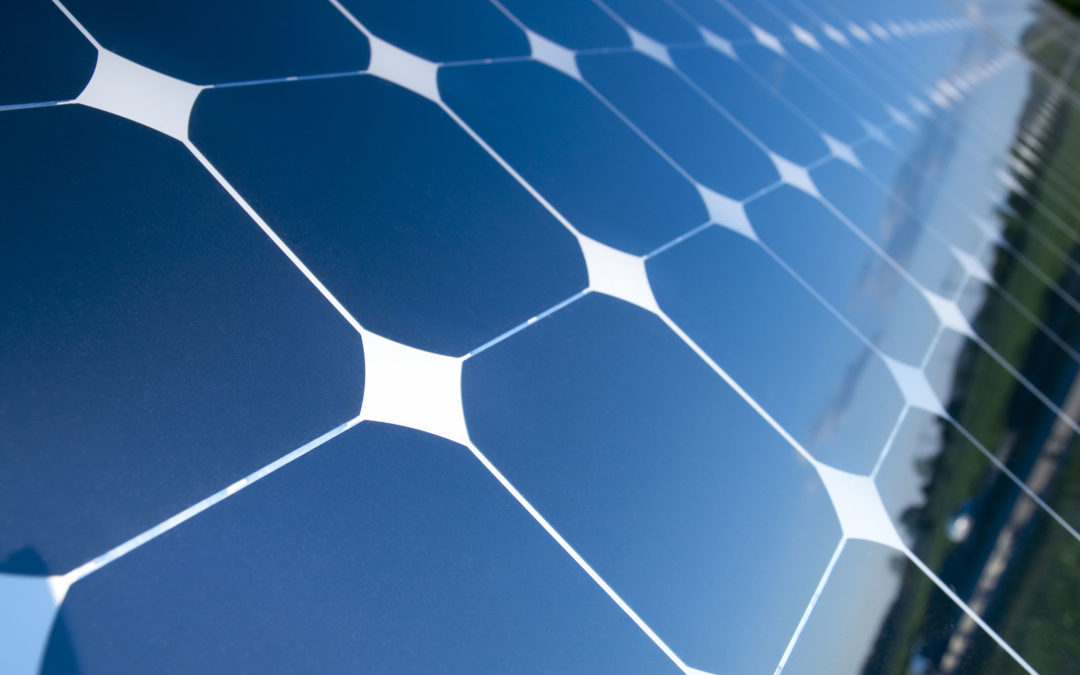
by Jodi Jean Amble | Oct 13, 2021 | Policy, Press Release, Solar, Utilities
Today, Senator Rob Cowles (R – Green Bay) and Representative Rachael Cabral-Guevara (R – Appleton) introduced legislation that would clarify using a lease, sometimes known as third-party financing, to acquire a solar array is legal in Wisconsin. RENEW Wisconsin and the members of the Wisconsin Solar Coalition applaud the introduction of this legislation and urge other legislators to support it.
“This legislation will expand access to solar energy in Wisconsin by allowing businesses and homeowners a basic financing option available in other states. Decades of Wisconsin case law and statutes allow for solar leasing or third-party financing,” said RENEW Wisconsin Executive Director Heather Allen. “However, over the past several years, some utilities have challenged solar installations with third-party financing structures. Since the Public Service Commission of Wisconsin and courts have avoided clarifying the law, it is up to the legislature. Without clarity, Wisconsinites lack access to all of the financing options they need to meet their clean energy goals, create jobs, and manage energy bills while improving the resiliency of the electric grid. Wisconsin must affirm the legality of third-party financing to facilitate the shift to clean energy for everyone.”
Across the country, leasing equipment is one of the most often used financing methods for distributed solar. This legislation is an opportunity to provide greater access to affordable, emission-free electricity for all Wisconsinites. Clarifying this law will positively impact many individuals, businesses, and organizations.
“As a building design consultant serving health care and educational clients, I see a tremendous appetite to utilize third-party financing to develop renewable energy projects, microgrids, and heat and power installations to drive down operational costs and increase resiliency, said Mike Barnett at HGA Architects and Engineers. He added, “Unfortunately, in Wisconsin, there is no legal clarity surrounding third-party financing. If the legislature clarified the legality of third-party financing, these types of capital investment projects and associated jobs would dramatically increase.”
Niels Wolter of Madison Solar Consulting said, “I have many not-for-profit and public (i.e., governmental) clients doing amazing work. They would love to do solar projects but don’t qualify for tax incentives. Third-party financing would be an amazing solution for them to generate solar power, reduce their operating costs and teach their communities about renewables.”
Allen added, “This is a simple question of giving individuals, businesses, and organizations the solar financing options that work best for them.”
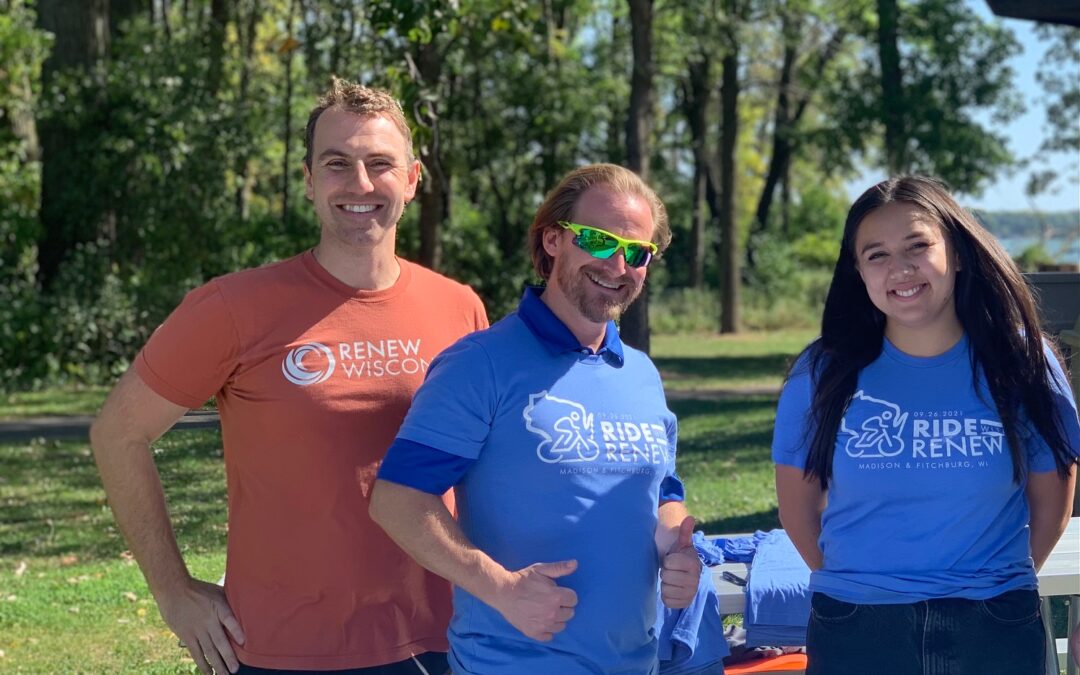
by Jodi Jean Amble | Sep 30, 2021 | Events, Solar
On Sunday, September 26, RENEW Wisconsin hosted the 8th Annual “Ride with RENEW” bike ride fundraiser in Madison and Fitchburg, WI.
We started the day at William G. Lunney Lake Farm County Park in Madison with over 40 determined bike riders! The 18-mile route featured the Capital City Trail and the Badger State Trail as riders enjoyed a sunny, windy day pedaling to our renewable energy tour stops.
Our first stop of the tour was Forest Edge Elementary School, the first zero net energy school in Wisconsin. The new $40 million school is energy-efficient, all-electric with geothermal heating and cooling and battery storage, and generates all its energy needs on-site from renewable energy. The 646 kW DC rooftop solar system with bifacial panels will save $82,000 annually in energy costs.
Next, we stopped at Promega, a major manufacturer of products for biotechnology and molecular biology that is leading the way in incorporating renewable energy for its own use. More than 1,300 kW of solar capacity has been installed around their Fitchburg campus, enabling Promega to slash its electricity consumption by 38% in 2020. At the same time, ground source heat pumps and solar water heaters allow the campus to cut back further on its fossil fuel use. To supplement their investments in energy efficiency and onsite renewables, Promega purchases power from a 2-megawatt share in the 20 MW O’Brien Solar Farm three miles away. Through these initiatives, Promega derives more than 20% of its total energy use from renewable energy sources.
Then it was a short bike ride to Fitchburg City Hall. In the last five years, the City has installed nearly 600 kW of solar capacity on City Hall, Public Library, two fire stations, and a public works maintenance facility. Following its adoption of a 100% renewable energy resolution in 2019, Fitchburg committed to purchasing a portion of O’Brien Solar Farm’s output. The combination of these initiatives will allow the City to meet approximately 40% of its operational needs with solar power.
Riders then biked to O’Brien Solar Fields, Dane County’s largest solar farm to date. This 20-megawatt solar array in Fitchburg covers the former O’Brien Dairy Farm with 60,000 solar panels. The project, developed by EDF Renewables and owned and operated by Madison Gas and Electric (MGE), supplies locally generated solar energy to local businesses, municipalities, and public institutions under MGE’s innovative Renewable Energy Rider (RER). Partners on this project include the City of Fitchburg, Placon, Promega Corporation, Tribe 9 Foods, University of Wisconsin-Madison, Willy Street Co-op, and the Wisconsin Department of Administration.
The next stop on our tour was All Saints Lutheran. Located along Highway PD near McKee Farms Park, All Saints Lutheran installed 56 bifacial solar panels in April 2021, with help from a Solar for Good grant. In addition to hosting church services for their own congregation, All Saints shares its space with the Spanish-speaking congregation of Iglesia Ebenezer Asambleas De Dios. All Saints took this step into solar for the long-term cost savings, but also because they take seriously the call to care for creation as a part of being good stewards of all God has given them. The 20.7 kW array is expected to supply 92% of the facility’s annual electric use.
Lastly, we stopped at one of the solar shelters near the Lussier Family Heritage Center where riders heard from Kathy Kuntz, from the Dane County Office of Energy and Climate Change. With more than 460 panels on four buildings providing renewable electricity to campers and day-use visitors, William G. Lunney Lake Farm County Park and Lussier Family Heritage Center represent Dane County’s first solar-powered park and campground. This year Staff Electric completed and energized a 66 kilowatt (kW) solar energy system at the park’s campground. This system includes rooftop arrays on both the shower building and the park shelter. A separate solar system, also installed by Staff Electric, consists of a rooftop array atop the Lussier Family Heritage Center as well as panels on a nearby park shelter along the Capital City Trail. This 76 kW installation will provide more than 90% of the power consumed by the Lussier Center. An electric vehicle charging station is also available at the Lussier Center. As of today, Dane County owns more solar systems than any other county in Wisconsin—with a combined capacity of more than 800 kW at 16 county facilities. Coupled with the 9 MW solar array at the Dane County Airport (which is a partnership with MGE), Dane County gets 45% of the electricity used for county facilities from renewable energy sources.
We ended the ride back at William G. Lunney Lake Farm County Park with a static electric vehicle display, pizza from Glass Nickel, beer from Wisconsin Brewing Company, and music by the Forward! Marching Band. WKOW Channel 27 stopped by our social hour and featured our riders on the evening’s local news.
This year’s ride highlighted a diverse application of renewable energy, particularly solar, in Dane County. Riders got a first-hand look at a solar farm, a solar-powered campground, a net-zero school, and solar on commercial, faith, and municipality buildings, all in a less than a 20-mile radius!
Thank you again to all of our sponsors, shown below, our bike riders, and everyone who donated to support our riders and helped us raise over $14,000 to continue our education, advocacy, and collaboration to advance renewable energy in Wisconsin!
2021 RIDE WITH RENEW SPONSORS
by Andrew Kell | Sep 13, 2021 | PSC Priorities, Public Service Commission, Renewables, Solar, Utilities
In a stunning policy reversal, Madison Gas and Electric (MGE) submitted a proposal to lower monthly charges and raise energy rates for its residential electric customers. Filed on September 3rd, MGE’s rate application is strongly backed by customer groups and clean energy organizations, including RENEW Wisconsin.
MGE’s filing is the product of negotiations over the summer with RENEW and other parties intervening in the case. If approved as is by the Public Service Commission (PSC), the agreement will pare the fixed charge for residential electric service from $19 per month today to $17 per month in 2022 and $15 per month in 2023. At the same time, energy rates will rise to offset the proposed reduction in the fixed charge.
The monthly fixed charge is the minimum amount assessed on residential customers for electric service. These charges do not vary with energy consumption levels. Hiking fixed charges invariably depresses the volumetric rate assessed to energy consumption, penalizing customers who use relatively little electricity and those who supply themselves with solar power produced onsite. Alternatively, lowering fixed charges and raising energy rates should achieve the opposite result by sending a stronger price signal to incentivize customer investments in energy efficiency and onsite solar.
“Low-income customers, solar customers, and customers who have invested in energy efficiency to reduce energy bills will benefit from this shift,” said Heather Allen, Executive Director for RENEW Wisconsin. “Overall, MGE customers will benefit because reduced energy demand helps limit the need for additional generation capacity. This is a win-win.”
The settlement avoids a contested case hearing in which Citizens Utility Board (CUB) and RENEW had been planning to submit testimony demonstrating that the $19 per month charge was excessive, especially in an urban service territory where the majority of electric customers are renters living in multifamily dwellings.
The MGE settlement follows a similar one struck with Xcel’s Wisconsin utility several months ago. Under the terms of that settlement agreement, which RENEW, CUB and other organizations signed onto, Xcel agreed to lower its fixed charge for residential electric service from $17 per month to $16 per month in 2022 and $15 per month in 2023. As with MGE, Xcel’s energy rates will also increase.
Other positive outcomes of the settlement include MGE’s support for a low-income thermostat pilot program, exploration of further innovative ways to help low-income customers achieve lower energy bills, and MGE’s increased support for smart thermostats and technologies, such as controlled water heaters, heat pumps, and battery electric storage in future filings.
The PSC is now accepting public comments on the MGE rate case. If you’d like to support the settlement agreement, please communicate your thoughts to the PSC via this public comment webpage specific to this case. For more information on the MGE rate case, see the Wisconsin State Journal article here.
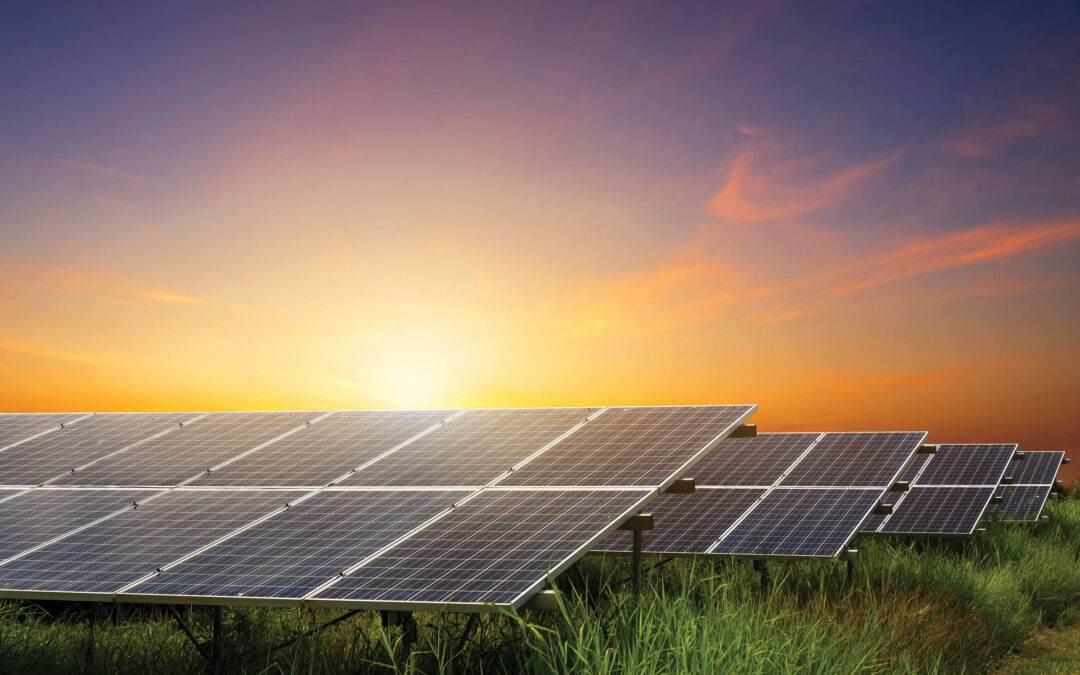
by Katelynn Samuelsen | Aug 30, 2021 | Solar
August is National Water Quality Month, a time to reflect on clean water’s vital role in our health, agriculture, and environment. Solar energy is frequently associated with cleaner air, but its benefit to Wisconsin water quality is often overlooked.
Agricultural producers are increasingly turning to solar power to reap a steady income from renewable electricity generated on their land. In addition to generating healthy economic returns for farmers, solar farming yields many positive impacts for local and global environments. Beyond reducing carbon emissions from burning fossil fuels for electricity, solar farms are vehicles for revegetating farm fields, significantly benefiting local water quality.
Solar farms on agricultural land are temporary land uses, lasting up to 30 years in most cases. During this period, the solar arrays interspersed with deep-rooted vegetation can dramatically reduce runoff that would otherwise seep into groundwater, lakes, and rivers. The equipment is removed when the solar farm is ultimately retired, and the land can return to active cultivation.
Consider the recently approved Onion River Solar project in Sheboygan County. When completed in early 2023, this 150-megawatt (MW) project should significantly reduce water pollution. Onion River’s developer, Ranger Power, plans to establish plantings compatible with grazing and pollinating around and underneath the solar arrays. During the Public Service Commission’s review of the project, Dr. Paul Mathewson, staff scientist for Clean Wisconsin, testified that replacing the existing cropping regime with mixed grasses will reduce phosphorus runoff to nearby surface waters by 85-98% in the local watershed. Over 30 years, the plantings will prevent 100,000 pounds of phosphorus from being added to the local stream network. Reducing phosphorus runoff into rivers and lakes is vital to preventing algal blooms which threaten aquatic life and recreation.
Like Onion River, the recently approved Darien Solar Energy Center, developed by Invenergy, should also improve water quality in the surrounding area. A 250-MW solar project in Walworth and Rock counties, Darien will employ a very similar approach to revegetating the impacted cropland. According to the Delavan Lake Improvement Association, Darien will revegetate approximately 2,000 acres that had been under active cultivation, which will promote more thorough drainage and inhibit the likelihood of erosion and runoff polluting nearby water resources. Additionally, the plantings will provide habitat for pollinators, enhancing biodiversity.
Invenergy’s latest proposal, the Koshkonong Solar Energy Center, envisions a 300 MW solar installation extending across 2,400 acres of active farmland in southeast Dane County, upstream of the Rock River. As with Darien, Invenergy plans to establish deep-rooted vegetation amid the arrays. According to Invenergy’s filings, the mix of prairie plants and other grasses should reduce stormwater runoff by 60%, nitrogen outflow by 48%, phosphorus outflow by 53%, and total suspended solids outflow by 87%. The Koshkonong solar farm is under review at the Public Service Commission.
While providing steady income to Wisconsin’s farmers, the Onion River, Darien, and Koshkonong solar farms will deliver significant value to Wisconsin’s environment above and beyond the electricity they will produce. Displacing coal and fossil gas generation with solar power will improve air quality and slash greenhouse gas emissions. Further, solar generation will play a critical role in mitigating water pollution in Wisconsin because these facilities temporarily replace agricultural row-cropping with deep-rooted vegetation cover over 30 years.
Find answers to frequently asked questions about solar farms here, and learn more about solar and agricultural land use here.
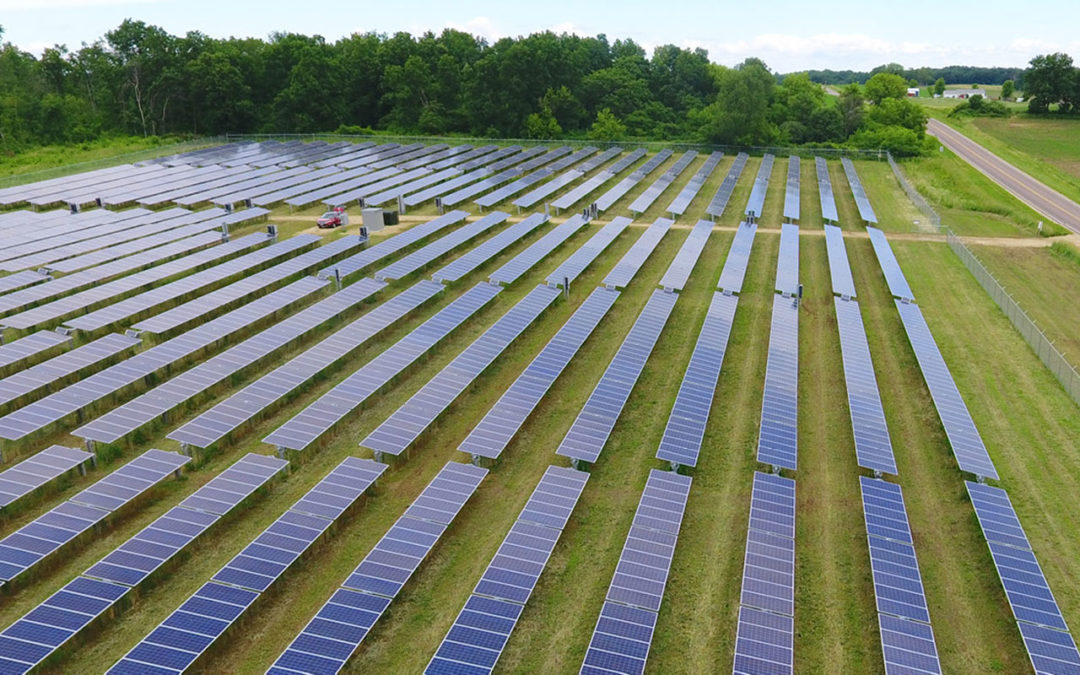
by Katelynn Samuelsen | Jul 23, 2021 | Advocacy, Community, Community Solar, Legislative Watchlist, Policy, Renewables, Solar, Utilities
This blog is from 2021 and does not reflect the 2023 iteration of the Community Solar Bill. For information on the current iteration check here.
Over the past few months, RENEW Wisconsin and our partners have been developing statewide policies that would expand customer access to community solar projects. The National Renewable Energy Laboratory defines community solar, also known as shared solar or solar gardens, as a distributed solar energy deployment model that allows customers to buy or lease part of a larger, offsite shared solar photovoltaic (PV) system. Community members subscribing to a solar facility receive credits for their share of the power produced, either in electricity bill savings or energy (kWh) credits.
New community solar projects are being rapidly developed around the country; 21 states, including Minnesota and Illinois, have already enacted policies that expand the community solar market between subscribing organizations and participating customers. Community solar deployment in the United States has achieved a five-year annual growth rate of 53%[1]. But, lacking statewide policies to promote community solar options, Wisconsin is quickly falling behind.
Since 2010, the number of solar energy systems purchased by US homeowners and businesses has grown tenfold. By the end of 2019, nearly two million homeowners and businesses were reaping the rewards from producing solar-generated electricity. Solar power is popular with many US consumers, and it has become an affordable option for many households and businesses. Yet access to solar power is limited. More than 50% of Wisconsin households cannot access solar energy onsite because they rent, live in multi-tenant buildings, have roofs that cannot host a solar system, or experience some other constraining factor.
In Wisconsin right now, only regulated utilities and cooperatives can provide energy from solar gardens to customers. A few utilities, like Madison Gas and Electric, offer a shared solar service that customers can enroll in today. However, most Wisconsin utilities do not currently have a comparable program available for their customers. That lack of access will persist unless state lawmakers adopt a modernized policy to promote a robust community solar marketplace.
Senator Duey Stroebel (R – Saukville) and Representative Timothy Ramthun (R – Campbellsport) have introduced legislation that would expand access to community solar in Wisconsin. This legislation enables the development of more community solar and supports energy freedom, expands customer choice, saves money on your utility bill, all while creating healthier and more resilient communities.
With a stronger statewide community solar policy, we would open the door for homeowners, businesses, schools, churches, and nonprofits to supply themselves with clean, affordable electricity from a local solar array.
Community solar legislation would benefit all utility customers by adding locally generated electricity to our energy grid while strengthening the rural economy at the same time. Community solar brings guaranteed savings for every subscriber as well as predictable and stable long-term energy costs. It gives customers a choice to support local clean energy projects while expanding access to affordable renewable energy for low-to middle-income residents.
Community solar expansion would allow more Wisconsin farmers to lease their land to host solar arrays and receive a guaranteed secure income for 25 years or longer. This drought-resistant cash crop is especially valuable for Wisconsin’s agricultural communities facing economic stress.
The soil underneath the panels can be planted with a variety of native plants and perennials. In addition to minimizing agricultural runoff and fixing nutrients in the soil, these perennials create a high-quality habitat for bees, butterflies, and other insects that move pollen in and around the fields and improve farm productivity.
When solar panels have reached the end of their useful lives, the equipment can be removed, and crop production can resume on the land that has become more fertile as a result of the native plantings.
A robust community solar market in Wisconsin will create thousands of jobs, spur hundreds of millions of dollars in economic growth, and save customers millions in utility bills. Community solar is proven to support economic development, expand consumer choice and bring clean energy to urban and rural communities across Wisconsin.
Learn more about the proposed community solar legislation at www.wisolarcoalition.com.
[1] The Vision of US Community Solar: A Roadmap to 2030





